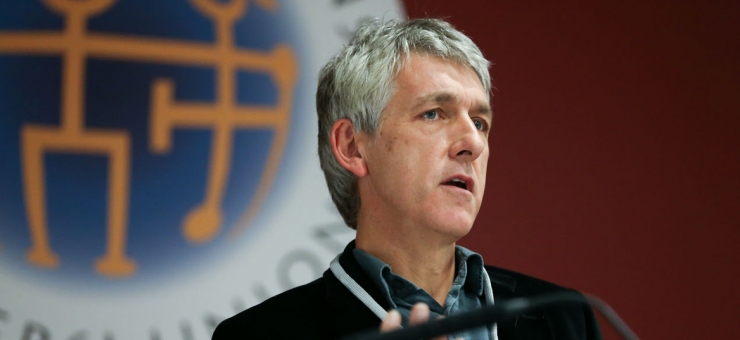Larry Elliott: 10 lessons from the global economic crisis

The Guardian’s Economics Editor Larry Elliott has revealed his ten lessons learnt from the global economic crisis.
Speaking at UNI Global Union’s World Executive in Dublin, Elliott compared today’s crisis to the 1973 recession which affected nearly all major economies in the world and put an end to the post-Second World War economic boom.
“The 1973 crisis came at the end of a 25 year golden age of social democracy built around the idea that when an economy grew, everybody gained a little,” Elliott said.
“It was a time of growing welfare states, stronger controls on capital, strong unions and the right to collective bargaining.
“But the 1973 crisis started a ten year process, by which time the western world was run along completely different principles. Instead of a rising tide lifting all boats, we had a trickle down economy. Where once there was room for trade unions, we now had strong anti-union laws.
“We had a situation that gave free rein to pollute the financial system.”
“When the 2008 crisis hit, the dark side of the world that had been created in the 1970s and early 1980s was exposed. As real wages had been suppressed, the only way people could make ends meet was to borrow money from a newly liberalised financial system which was only too pleased to provide for them.
10 Lessons learnt from the current economic crisis:
- The left did not take its chance when there was a policy vacuum in 2008. It is still business as usual. The financial crisis has not changed the prevailing ideology towards the financial system.
- We now have a system of zombie banks. They have been bailed out and are not providing credit to small and medium-sized businesses and are failing to stimulate growth.
- We are at risk of becoming locked into a low wage, low productivity employment market. The power structure is very much the same as before. Inequality has got worse, not better. Labour has become cheap whilst capital has become expensive.
- Banks have managed to stave off financial transaction tax and splitting up into investment and consumer banking.
- The G20 has been a grave disappointment and is bordering on dysfunctional.
- Austerity has not worked. The time to deal with a budget deficit problem is during a boom, not during a slump.
- There is little policy space left. We are in a dangerous place. Governments have not shown themselves to have the flexibility or belief to handle a possible second leg of this crisis.
- Unemployment is frighteningly high and putting strain on the social fabric of countries. It is staggering that there has not been more social unrest.
- Central bankers and finance ministers have no idea what they’re doing. They exude confidence but it is an utter pretence. They don’t know how to exit from this crisis.
- The solutions are not palatable to the powerful elite. Stronger trade unions, higher levels of growth, spending more on public infrastructure, putting pressure on creditor nations to adjust, not just to detonate, a debt jubilee of the sort that was provided for developing countries. If we took all these measures we would challenge business as usual, we would challenge the power structure of the global economy.

